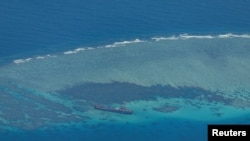Philippine government personnel transported food and other supplies Saturday to a shoal occupied by a Filipino navy contingent but closely guarded by Beijing's forces in the South China Sea. No confrontations were reported, Philippine officials said.
It was the first Philippine government supply trip to the Second Thomas Shoal, which has been the scene of increasingly violent confrontations between Chinese and Philippine forces since the Philippines and China reached a deal a week ago to prevent clashes, the Department of Foreign Affairs in Manila said in a statement.
"The lawful and routine rotation and resupply mission within the Philippines' exclusive economic zone is a credit to the professionalism of the men and women of the Philippine navy and the Philippine coast guard and the close coordination among the National Security Council, Department of National Defense and the Department of Foreign Affairs," the Philippine Foreign Affairs Department said, without providing other details.
A top Philippine security official told The Associated Press that the Chinese and Philippine coast guards communicated for coordination Saturday, and their ships did not issue two-way radio challenges like in the past to demand that each other's ships leave the shoal immediately.
Also, for the first time at the shoal, Chinese coast guard ships did not shadow or block the Philippine vessels as they had repeatedly done in the past, said the official, who spoke on the condition of anonymity because of a lack of authorization to discuss the issue publicly.
Delivery followed deal
China's coast guard said the Philippine ship delivered daily necessities "in accordance with a temporary arrangement reached between China and the Philippines."
"The China Coast Guard confirmed it, supervised and managed the entire process," spokesperson Gan Yu said in a statement posted online.
The deal was reached by the Philippines and China after a series of meetings between the two country's diplomats in Manila and exchanges of diplomatic notes aimed to establish a mutually acceptable arrangement at the shoal — which Filipinos call Ayungin and the Chinese call Ren'ai Jiao — without conceding either side's territorial claims, Philippine officials said.
The deal has not been made public by either side.
U.S. Secretary of State Antony Blinken welcomed the news that the resupply mission was completed without a confrontation.
"We applaud that and hope and expect to see that it continues going forward," said Blinken, who was in Laos for a meeting of foreign ministers of the Association of Southeast Asian Nations, a group that includes the Philippines.
Water cannons, blocking manuevers
China's coast guard and other forces have used powerful water cannons and dangerous blocking maneuvers to prevent food and other supplies from reaching Filipino navy personnel at Manila's outpost at the shoal, on a long-grounded and rusting warship, the BRP Sierra Madre.
In the worst confrontation, Chinese forces on motorboats repeatedly rammed and then boarded two Philippine navy boats on June 17 to prevent Filipino personnel from transferring food and other supplies, including firearms, to the ship outpost in the shallows of the shoal, according to the Philippine government.
The Chinese seized the Philippine navy boats and damaged them with machetes and improvised spears. They also seized seven M4 rifles, which were packed in cases, and other supplies. The violent faceoff wounded several Filipino navy personnel, including one who lost his thumb, in a chaotic skirmish that was captured in video and photos that were later made public by Philippine officials.
China and the Philippines blamed each other for the confrontation and each asserted their own sovereign rights over the shoal.
Allies call for freedom of navigation
The United States and its key Asian and Western allies, including Japan and Australia, condemned the Chinese acts at the shoal and called for the rule of law and freedom of navigation to be upheld in the South China Sea, a key global trade route with rich fishing areas and undersea gas deposits.
In addition to China and the Philippines, Vietnam, Malaysia, Brunei and Taiwan have been locked in separate but increasingly tense territorial disputes in the waterway, which is regarded as a potential flashpoint and a delicate fault line in the U.S.-China regional rivalry. The U.S. military has deployed Navy ships and fighter jets for decades in what it calls freedom of navigation and overflight patrols, which China has opposed and regards as a threat to regional stability.
Washington has no territorial claims in the disputed waters but has repeatedly warned that it is obligated to defend the Philippines, its oldest treaty ally in Asia, if Filipino forces, ships and aircraft come under an armed attack, including in the South China Sea.
